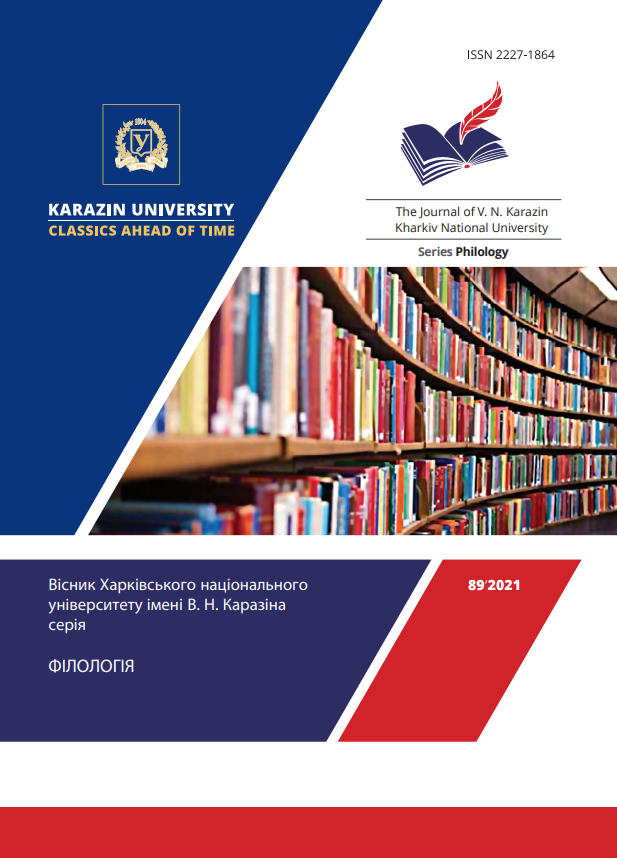Роль семантеми «Серце» в структурі поля «Духовний стан» (на матеріалі російської мови)
Анотація
У статті розглядається питання про денотативний простір понять поля духовного стану, аналізується семантична структура лексеми «серце», робиться спроба реконструкції семантеми ‘серце’ на підставі даних лексикографічних словників, контекстів мовного вживання і стійких поєднань, проаналізовано гнізда семантем кожної семантичної ознаки стратифікованого комплексу, де вона виступала як домінантна. Зроблено спробу повного опису структури семантеми ‘серце’ на рівні мовних прототипів і на рівні реалізації цих прототипів у мові. Автор звернув увагу на прецедентні тексти ранньої історичної епохи, де було помічено, що абстрактні поняття на мовному рівні позначалися за допомогою лексичної одиниці «сердце», але на сучасному етапі розвитку мови у всіх цих понять існує окрема лексема. Це спостереження дало автору можливість стверджувати, що ‘серце’ є однією з перших семантем духовного сектору системи «Людина». На підставі аналізу стверджується, що в ієрархії духовного сектору семантема ‘серце’ займає ядерне положення, вона, спочатку номінуючи конкретну реакцію серця як органу, поширювала поле значення у напрямку трьох інших базових смислів – ‘думки’/‘почуття’/‘бажання’, що давало можливості мовної свідомості для побудови усіх наступних абстрактних понять, ядерні узагальнені ознаки семантеми ‘сердце’ можна виявити у складі семантичної структури одиниць, що номінують сферу духовності.
Дослідження семантеми ‘серце’ сприяло можливості нового бачення денотативного простору лексики емоцій і психічних станів в цілому. Автор пропонує включати до денотативного простору оцінку явища учасником, інтенсивність прояву реакції серця, інтенсивність бажання, мімічну або дієву реакцію. Пропонується уточнювати інтенсивність за допомогою шкали з позитивними і негативними показниками.
Результати даної роботи актуальні у сфері сучасної лінгвістики, яка прагне до об'єднання з такими природними науками, як біологія мозку і психологія.
Завантаження
Посилання
Apresjan Ju. D. Obraz ljudini za danimi movi. Sproba sistemnogo opisu. Vibranі pracі, tom II. Іntegral'nij opis movi і sistemna leksikografіja. Moskva: Shkola «Movi rosіjs'koї kul'turi», 1995. S. 348–388.
Bіblіja. Moskva: Rosіjs'ke Bіblіjne Tovaristvo, 2014. 292 s.
Vezhbic'ka A. Tlumachennja emocіjnih konceptіv. Mova. Kul'tura. Pіznannja. Moskva: Rosіjs'kі slovniki, 1996. S. 326–376.
Gak V. G. Do tipologії lіngvіstichnih nomіnacіj. Movna nomіnacіja. Moskva: Nauka, 1977. S. 230–294.
Gіl'ferdіng A. Pro sporіdnenіst' movi slov'jans'koї z sanskrits'koju. Sankt-Peterburg: Drukarnja Іmperators'koї Akademії nauk, 1853. 294 s.
Dal' V. Tlumachnij slovnik zhivoї velikorus'koї movi: v 4 t. Moskva: Rosіjs'ka mova, 1989. 779 s.
Danilova R. R. Funkcіonuvannja konceptu «serce» v emocіjno-chuttєvіj і duhovnіj sferah ljudini v tatars'kіj і rosіjs'kіj movnih kartinah svіtu. Vіsnik ChDPU. № 11. 2009. S. 228–234.
Zamanova І. V. Іzomorfіzm nomіnativnih modelej abstraktnih substantivіv dushevnogo і fіzichnogo stanіv. Vіsnik Harkіvs'kogo nacіonal'nogo unіversitetu іm. V. N. Karazіna. Fіlologіja. V. 85. 2020. S. 48–54.
Zamanova І. V. Rol' kompleksnogo pіdhodu v opisі nomіnativnih movnih zasobіv (na prikladі signifіkata «dushevnij stan»). Vchenі zapiski Tavrіjs'kogo nacіonal'nogo unіversitetu іm. V. І. Vernads'kogo. T. 31. № 1. 2020. S. 155–161.
Lakoff Dzh., Dzhonson M. Metafori, jakimi mi zhivemo. Moskva: Editorial URSS, 2004. 256 s.
Makarova V. L. Semantika і funkcіonal'nі harakteristiki slova cor v tekstah Avrelіja Avgustina: na prikladі «Spovіdі»: avtoreferat dis. ... kandidata fіlologіchnih nauk. Sankt-Peterburg. 2011. 18 s.
Ozhegov S. I., Shvedova N. Ju. Tlumachnij slovnik rosіjs'koї movi. Moskva: TOV «ІTІ tehnologії», 2003. 944 s.
Pedchenko L. V. Perceptivna metafora jak zasіb stvorennja «obrazu ljudini» v rosіjs'kіj dіalektnіj movі. Vіsnik Harkіvs'kogo nacіonal'nogo unіversitetu іmenі V. N. Karazіna. Fіlologіja. V. 77. 2017. S. 50–55.
Plotnikova A. M. Dієslova z vkljuchenoju aktantnoj ramkoju: onomasіologіchnij і kognіtivnij aspekti. Denotativnij prostіr rosіjs'kogo dієslova / Za red. Babenko L. G. Єkaterinburg: Vyd-vo Ural. un-tu, 1998. S. 117–120.
Plotnikova Ju. І. Denotativnij prostіr dієslіv «visіti», «lezhati», «sidіti», «stojati». Denotativnij prostіr rosіjs'kogo dієslova / Za red. Babenko L. G. Єkaterinburg: Vyd-vo Ural. un-tu, 1998. S. 130–133
Rudjakov A. N. Mova, abo Chomu ljudi govorjat' (dosvіd funkcіonal'nogo viznachennja prirodnoї movi). Ky`yiv: Gramota, 2004. 224 s.
Sapegіna І. A. Koncept serce jak domіnanta emocіjnoї kartini svіtu v rosіjs'kіj movі v dzerkalі kitajs'koї movi: avtoref. dis. ... kand. fіlol. n. Moskva, 2011. 20 s.
Sokolovs'ka Zh. P. Sistema v leksichnіj semanticі. Ky`yiv: Vishha shkola, 1979. 189 s.
Ushakov D. N. Tlumachnij slovnik. URL: https://ushakovdictionary.ru/word.php?wordid=81019.
Fіllmor Ch. Sprava pro vіdmіnok. Nove v zarubіzhnіj lіngvіsticі. V. 10. Leksichna semantika. Moskva: Progres, 1981. S. 369–495.
Chernejko L. O. Lіngvo-fіlosofs'kij analіz abstraktnogo іmenі. Moskva: Vyd-vo MDU, 1997. 400 s.
Shevel'ova M. S. Slovnik rosіjs'koї movi: t. 4. Moskva: Ros. mova, 1985. 736 s.




